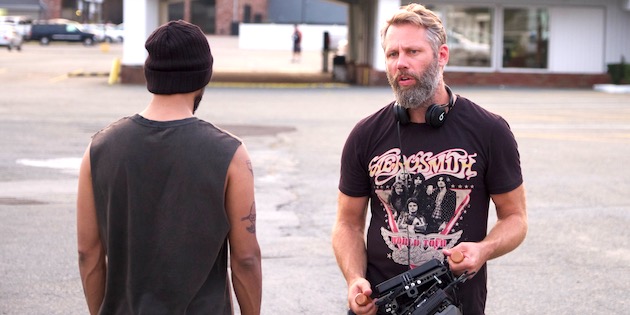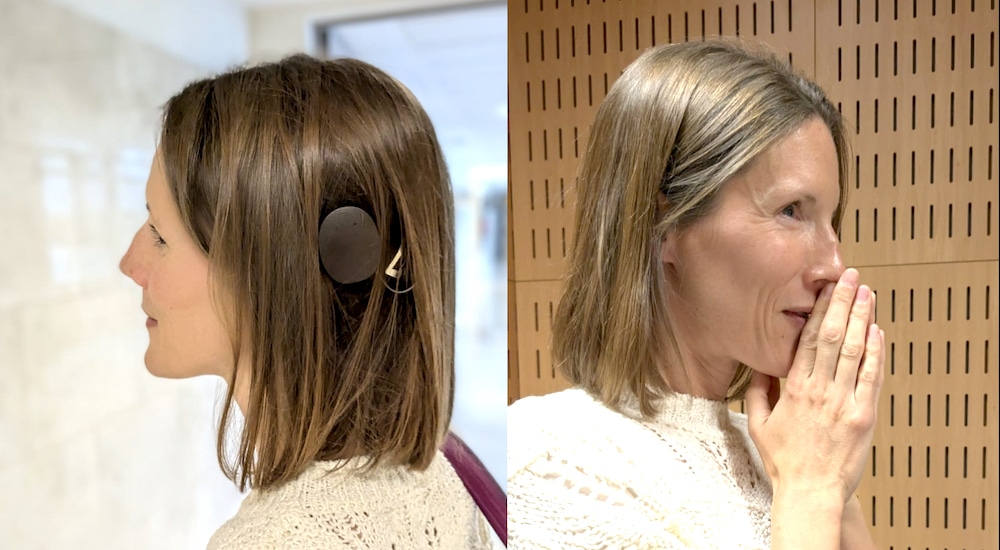Interview with Sound of Metal director Darius Marder: “This film doesn’t have an opinion about cochlear implants.”
cinema
Darius Marder’s double Oscar-winning movie, Sound of Metal, has chimed from sweetly to jarringly in the audiology community. In this exclusive interview, the director throws light on the complex blend of story, character portrayal, and audiological realities in this must-see film.

The noise that Sound of Metal has made about hearing loss is undeniably loud and far-reaching. Comments across the audiology community reflect joyful surprise and gratitude that director and writer Darius Marder’s story of a noise-metal drummer who experiences sudden hearing loss finally made it through the Hollywood business filters to become a cinema screen product, and one whose success has been recharged non-stop by prizes from the film world.
A simple story with unfolding complexities
The Sound of Metal noise reverberated around the Academy of Motion Picture Arts and Sciences, drawing no fewer than six Oscar nominations (winning two, for Best Film Editing and Best Sound).
Those are serious awareness decibels for the issue of hearing loss, which at least seems to be the central focus of the film, as actor Riz Ahmed, in a stellar performance, channels the catharsis and conveys the horror of the sudden deafness his character, Ruben, will deal with through several degrees of shock, panic, and masterfully transmitted angst.
But we learn, and subtly, that Ruben’s sudden sensory catastrophe, a none-too-surprising occupational consequence of his exposure to eardrum-shattering music, has arrived on top of another problem, his drug addiction, from which he is so far successfully in rehab.
The story is apparently simple. A guy loses his hearing. What will he do about it to bring us back to the order we crave at the end of all movies? But there’s the other problem too: Ruben’s drug past. And is this also the end of his relationship with his girlfriend, Lou, who has been by his side, as singer and manager, screaming along in performance to Ruben’s drumming?
It is the hearing journey part of the film, however, that has brought dissenting voices against Sound of Metal. Ruben finds his way to Joe, the deaf leader of a sober house for deaf addicts that is run strictly to Deaf community ideals. Ruben is bent on getting his hearing back and, against the house rules, anxiously pursues the route of technology: a cochlear implant. But for Joe, superbly played by Paul Raci, an actor who was actually raised by deaf parents, deafness is something you don’t fix.
We hear Joe tell Ruben that he must learn how to be deaf (Deaf?), find the moments of stillness, the “kingdom of God”. From there, what we see in the story, is a young man who receives a cochlear implant and struggles in noisy surroundings, eventually (spoiler alert!) taking a moment in city surroundings to disconnect it and dwell in the silence, literally and, of course, metaphorically, in the stillness of acceptance. But for many, this is a kick-in-the-tympanum message for the cochlear implant hearing restoration solution, and even for hearing aids, since – as some have complained – no hearing aids are proposed to Ruben, who has some residual hearing, though we are not sure how much.
Director Darius Marder
The film stands up as a work of cinema, and no director of films at this level is under any obligation to make statements supporting one camp or another, or fulfil a public information role. In a parallel Sound of Metal film, Ruben might tell Joe to take a hike and we might see him progress along the route of technological support. But this is Darius Marder’s film, and he is the best person to ask about its complexities and deeper significance:
Audiology Worldnews (AWN): Darius, beyond the success of Sound of Metal as cinema art or in the box office, your picture is out there as a document on hearing loss. How comfortable is it for you that it will be scrutinised by experts across several fields, as well as by sufferers of hearing loss?
Darius Marder (DM): That’s a good question. I would say that I’m very comfortable with the movie that I ended up making. I understand the choices I made. I have a lot of respect for people in the audiology community, and I’m uncomfortable thinking about some people who might watch the film and feel like it’s anti-cochlear implant. This film is literally not. This film, in fact, doesn’t have an opinion about cochlear implants. Cochlear implants are simply a fact, and some members of the Deaf community with a capital D don’t think that they should be a given solution. That’s not my opinion. And cochlear implants do in fact sound a lot worse than what is depicted in the movie, by almost all accounts.
So, the movie presents it factually. I would say that where I’m uncomfortable is with some of the process of getting those implants. And I know from the amount of research I did how complicated that process is, how in-depth that process is, and I couldn’t show that whole process in this movie. I couldn’t tell that story; it’s not a documentary on getting cochlear implants. I sometimes want to send a message to the audiology community that I do know that it’s hard when you see aspects of what you do, especially when members of the audiology community don’t get a lot of play, people aren’t paying attention to them most of the time, and when they are, you know here is a movie that is finally highlighting audiology and it’s not an exact document in that way in terms of process. I’m aware of that.
Just because you didn’t see it doesn’t mean it didn’t happen, so they see Ruben suddenly getting an implant; that doesn’t mean Ruben didn’t have extensive consultation before that. You just didn’t see that in the movie. And that is the same language that I use all over the movie, not just around audiology. For instance, you learn sign language over five months, but you suddenly see that he knows it. You don’t see the whole process. That’s the part that I’m uncomfortable with in the sense that I have a lot of empathy with that community and I have a lot of respect for what they do.
In the movie they refer to cochlear implants not being covered by insurance [US Medicare], and I don’t think that’s always true; they are sometimes. In fact, hearing aids are not covered whereas cochlear implants now are, and I had had mixed information about that at the time I was writing this, which was many many years ago, so those are the things I look back on and think “oh I hope no one feels bad about that”.
Acceptance. Stillness isn’t quietness
AWN: Nevertheless, Sound of Metal does appear to lean towards the philosophy propounded by the sober house leader Joe that deafness is not something to fix. Was it the film’s intention to get across that the moment of stillness, the “kingdom of God” Joe talks to Ruben about, is the right and only goal for someone with deafness?
DM: It’s certainly not. You know, that is in many ways a very surface way of experiencing that moment. The film is very much about the five stages of grief, and when you step back from the conversation about deafness and implants and all the rest of it, in many ways the film is less about deafness than it is about addiction, and about a very universal affliction that even addiction overstates, which is to say ‘oh those people have addictions’, but the way that we deal with loss, abandonment, our attachments, which we all have, could be a very universal experience.
And it’s a film about those stages that ultimately have to end up in acceptance. It isn’t really about the thing itself; it’s a state of mind. In my view, once there is acceptance, that’s about stillness, and stillness isn’t quietness. You know, there’s the literal quietness that you get when you take the implants off, and there’s the stillness that you can only have that is from a place that’s internal and within. And they are two different things.
There are many people who might experience quietness without stillness. There are many deaf people that can’t hear but that have a tremendous noise inside them. So, I think that moment that you are referring to is really meant, in my intention, to be a very universal moment, and much less about the actual answer on any level about whether someone should or should not have an implant, or whether Ruben should or should not; I think it’s immaterial. I actually think it’s immaterial to Joe, to tell you the truth. I don’t even think the character of Joe really asks him to leave because of the implant; I think he asks him to leave because of his state of mind.
AWN: In writing the film, with your brother Abraham and friend Derek Cianfrance, was it a conscious aim to take the hearing person through the experience of deafness but reach the person with hearing loss as well?
DM: It’s a film that obviously deals with a very detailed sonic reality, even deafness experienced in a sonic way, which is of course, by default, for people who are hearing. Obviously, that whole sound element of it, which is a big part of the cinema of the movie, is specifically for a hearing audience but, you know, we spent a lot of time thinking about, in the mix of that, the low frequencies, how that plays, the sub-woofers, having extremely low lows, and part of the reason for that was that people who are hard of hearing, and deaf audiences, can also feel the sound of the movie as they are watching. So, even from the sonic perspective, we were always thinking about deaf and hard of hearing audiences, because of course they feel and perceive sound on a big wide spectrum. But even beyond that we always wanted it to be a film that was for all audiences. Although it has this big sound design, it’s not a film that is exclusive to hearing people; the captions are a part of the sound design, they relate to the sound design, and in many ways they are to allow people who are deaf and hard of hearing to experience that.
The difficulty of simplicity
AWN: In trying to convey Ruben’s experience, both audiologically and psychologically, what were the trickiest areas to write onto the screen?
DM: I think the hardest thing to write is simplicity, to feel something without telling it, to actually just show it in the movie, so it actually took a very long time to really wrestle with the depths of these characters, specifically Ruben, so that it would kind of feel like it effortlessly showed itself on the screen, and what that meant was really just understanding the landscape of what he is. He’s a person who has dealt with a lot of trauma in his life, and a lot of loss and abandonment, and a whole history of addiction, and more.
My highest bar as a writer is about how you feel that without it being these very well-worn cards of “oh this is the part of the movie where we get the back story”, you know, things where you start to feel the hand of the writer, and I’m very allergic to that in the realm of storytelling, you know those quiet moments where you now talk about your dad.
It took a long time to find that the truth of Ruben kind of seeps into the moments. Joe asks them at one point how long they’ve been together, and then he asks him ‘how long have you been an addict?’, and they happen to be the same amount of years, and that little amount of information should give you a whole world of thought about Ruben and Lou’s relationship. I love the movies where you get a little hint of something that gives you a huge amount of context. So often when you’re writing, less could be less (and not more). You know, it’s a fascinating dance; it’s one thing to say it and another to accomplish it, and some of that’s in the editing.
Addiction
AWN: You and your brother first came into contact with hearing loss through your grandmother’s sudden deafness. Was that an important influence on Sound of Metal?
DM: Our grandmother, Dorothy, lost her hearing after taking an antibiotic. She lost it fairly early in life. It wasn’t like a normal grandmother losing it late in life. And it was very tragic for her, and she was a big influence for us because she also dealt with addiction. She dealt with alcoholism, and that really surfaced after she lost her hearing because she, very much like Ruben, was caught between two cultures, hearing and deaf culture. She didn’t have access to either because she didn’t have language. She couldn’t speak with hearing people and she couldn’t speak with deaf people; she was in no person’s land, so she was a big part of that journey for us, and even part of Ruben. So it does have that personal element.
Protect, prevent
AWN: Through all the thought you have put into aspects of hearing loss during the writing and making of the film, what reflections have you developed about prevention of loss and noise protection?
DM: As a matter of fact, I think that is one of the most quantifiable effects, because I can’t tell you the amount of things I’ve read or heard or been told about ̋oh my God, I’m going to protect my ears from now on ̋. There’s so much damage that we get from this onslaught of noise, and some of that’s just headphones, and some of that’s concerts, and machinery. But I definitely think hearing people leave this film saying “man! I’m going to protect my ears!” And I think that extends to serious people, and the military…it’s just been a long time coming, and it’s tragic because when you lose it, you lose it and it doesn’t grow back, it doesn’t heal itself. A lot of musicians have come to me, and musicians really suffer from tinnitus, especially drummers so close to those crash cymbals. And I hope people certainly do take precautions; I can tell you that I think a lot about that now.
Source: Audio Infos UK issue 142 May-June 2021







